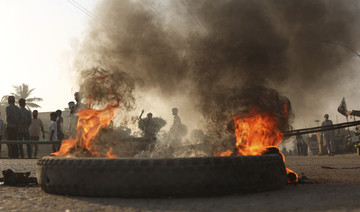ISLAMABAD: Stressing on the fact that Pakistan’s government had very few legal and political options to deal with protestors seeking a reversal of the Supreme Court’s verdict acquitting a Christian woman, Aasia Bibi, in a blasphemy case, experts said on Friday that the best way forward would be to resolve the issue through dialogue.
Sharafat Ali, a Supreme Court senior advocate, told Arab News that the government is not a complainant in the blasphemy case and therefore it can do little to “legally meet any requirements of the protesters”.
Bibi, a 51-year-old woman and a mother of five, was accused of blasphemy in 2009 in Sheikhupura and was awarded the death sentence by the lower courts. She had been in prison ever since. The country’s top court on Wednesday acquitted Bibi of blasphemy charges, reasoning that the prosecution had categorically failed to prove its case.
Shortly after the verdict, activists of a far-right religious party, the Tehreek-e-Labbaik Pakistan (TLP) took to the streets in all major cities of the country, including Islamabad, Karachi and Lahore, and blocked the main arteries, thereby disrupting public life. They have also been accused of inciting followers through fiery speeches against members of the army and the judges who passed the verdict.
Ali said that the government should have charged the leaders of the protesting parties with “treason”, specifically the TLP’s wheelchair-bound leader, cleric Khadim Hussain Rizvi, and his associates, for the incitement against state institutions.
“If the government fails to register cases against some key clerics leading the protests under incitement and treason charges, this will further embolden the extremists,” he said.
Talking to media persons outside the Parliament House on Friday, Minister of State for Interior Shehryar Afridi said that the government was negotiating with the party leaders and “there will soon be a positive progress.”
He, however, categorically said that the government will not use force to disperse protesters. “We don’t want any bloodshed,” he said.
Tahir Malik, an academic and a political analyst, said the government is caught in a catch-22 situation as protesters have refused to back down from their demand under the verdict was reversed.
“Dialogue seems to be the only option to resolve the issue peacefully,” he told Arab News.
“If the government uses force against protesters, a considerable segment of the society can move against the authorities and further complicate the issue,” he said.
Malik said that there is a need to devise a long-term strategy to de-radicalize the society through the teachings of Islam. “Entire political leadership should join hands to ostracize extremists and ideology of extremism in the society,” he added.
Government caught between a rock and a hard place with ongoing protests
Government caught between a rock and a hard place with ongoing protests
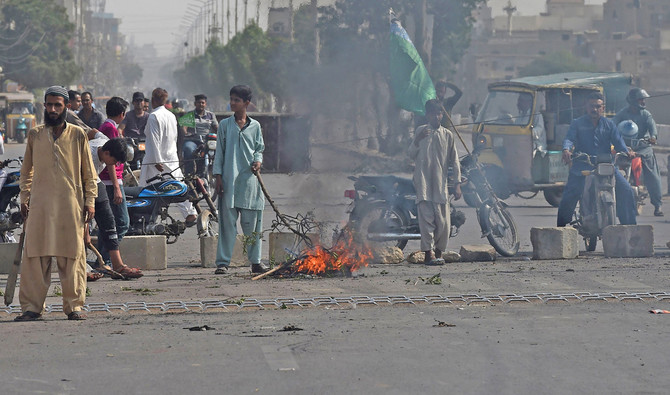
- Seeks to resolve issue amicably, even as demands for death continue for Christian woman
- Lawyers urge authorities to charge protest leaders with incitement of violence and treason
Pakistan’s finance minister says new IMF loan agreement targeted for early July
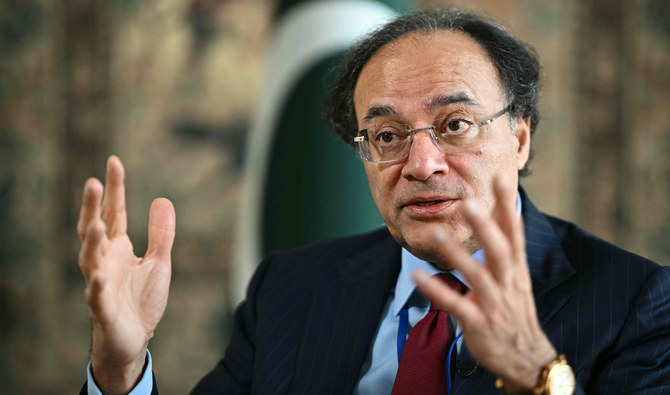
- The quantum and duration of new loan is still not clear, though the government wants at least a three-year program
- Muhammad Aurangzeb says the modalities of the new loan will be thrashed out with an IMF delegation next month
ISLAMABAD: Pakistan’s finance minister Muhammad Aurangzeb said on Tuesday the country planned to discuss the contours of a new loan program with an International Monetary Fund (IMF) delegation next month while hoping to reach a staff-level agreement with the global lender by early July.
Pakistan secured a $3 billion IMF bailout last year to avert a sovereign default and hopes to receive the final tranche later this month. However, the government wants a fresh IMF loan since the country continues to face tough economic challenges and plans to implement structural reforms.
“We are still hoping that we can get into a staff-level agreement by the time June is done or early July so that we can move on,” the finance minister said while addressing a news conference.
He informed he had had good discussions with IMF and World Bank officials during the spring meetings held by both international lending organizations in Washington.
Aurangzeb maintained it was not right to say that the IMF was imposing strict conditions on Pakistan since the country needed to carry out reforms on its own to strengthen its economy.
“This is Pakistan’s program which is helped, supported, assisted by the fund,” he said. “This is how we have to see it since this is the way ownership will come.”
He said the quantum and duration of the new IMF program was yet not clear, though the government wanted to secure at least a three-year loan package.
Both sides have said they were already in discussions for the new loan.
A formal request, however, will be made once the current facility expires, with the IMF board likely to meet late this month to approve the second and last tranche of the current support scheme.
The economy is expected to grow by 2.6 percent in the fiscal year 2024, the finance minister said, adding that the inflation was projected at 24 percent, down from 29.2 percent in fiscal 2023.
It touched a record high of 38 percent last May.
Aurangzeb said structural reforms would include increasing the government’s tax revenue-to-GDP ratio to 13 percent to 14 percent in the next two or three years from the current level of around 9 percent, reducing losses of state-owned enterprises through their privatization, and better management of the debt-laden energy sector.
With input from Reuters
Pakistan refiners warn $6 bln upgrades at risk due to fuel price deregulation plan
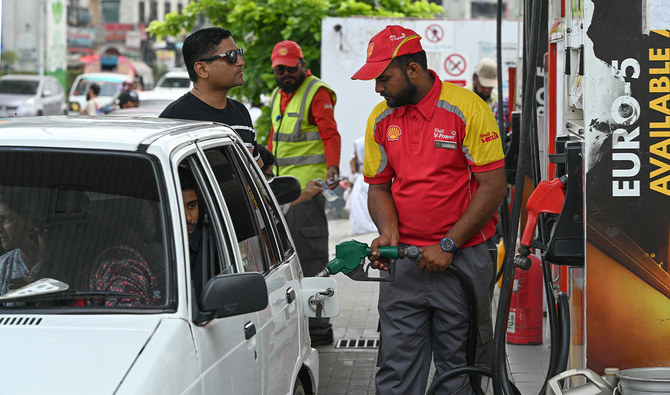
- Regulatory authority proposes oil marketers, refineries be allowed to set prices instead of government
- Refiners demand they be consulted before the implementation of “irrational recommendations”
KARACHI: Pakistan’s plans to deregulate fuel prices could lead refiners to halt planned upgrades worth up to $6 billion and force some refineries to close, some of the country’s top refiners said in a letter to the country’s oil regulator.
Looking to drive down prices for consumers, the South Asian nation’s Oil & Gas Regulatory Authority (OGRA) has proposed that oil marketers and refineries be allowed to set fuel prices, instead of the government setting prices.
As part of the change, OGRA proposed scrapping or reviewing a rule that requires fuel buyers to purchase supply from local refineries, another issue the refiners said could result in “disastrous consequences.”
The refiners — state-run Pakistan Refinery and private domestic refiners Pak Arab Refinery, Attock Refinery, Cinergyco, and National Refinery — said they were already struggling to operate near full capacity and asked that they be consulted before the implementation of “irrational recommendations.”
“The refining sector requires OGRA support through pragmatic and supportive measures, rather than suggesting ways that if implemented would result in their permanent closure,” the refiners told OGRA on Monday in a letter, which was reviewed by Reuters.
The deregulation was aimed at boosting competition and protecting the public interest, OGRA told Reuters in a statement on Tuesday, but did not respond to specific questions on the letter from the refiners. However, it said in an April 17 presentation reviewed by Reuters the potential impact of deregulation on refinery upgrades had to be assessed carefully, calling it a challenge.
“The refineries upgradation will bring in investment of $5 — 6 billion and not only result in cleaner environment friendly fuels but also result in savings of precious foreign exchange of the country,” the refiners wrote in the letter to OGRA.
Pakistan hopes to get new IMF loan by early July, says finance minister
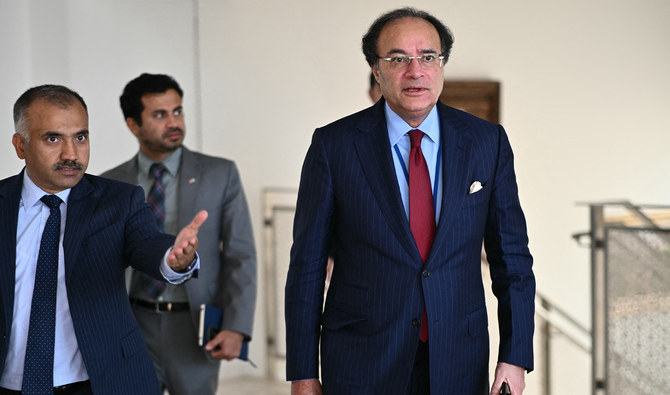
- Pakistan’s current $3 billion financial arrangement with IMF expires in late April
- Islamabad is seeking “bigger,” long-term loan to ensure macroeconomic stability
Pakistan is hoping to reach a staff-level agreement with the International Monetary Fund by June or early July, its finance minister said on Tuesday.
The country’s current $3 billion arrangement with the fund runs out in late-April, which it secured last summer to avert a sovereign default.
Islamabad is seeking a long-term bigger loan to help bring permanence to macroeconomic stability as well as an umbrella under which the country can execute structural reforms.
“We are still hoping that we get a staff-level agreement by June or early July,” Finance Minister Muhammad Aurangzeb told a conference in Islamabad.
He returned from Washington last week after leading a team to attend the IMF and World Bank’s spring meetings. “We had very good discussions in Washington,” he said.
He said he did not know at this stage the volume and tenure of the longer program.
Pakistan ‘rarely’ punished officials for rights abuses in 2023— State Department report
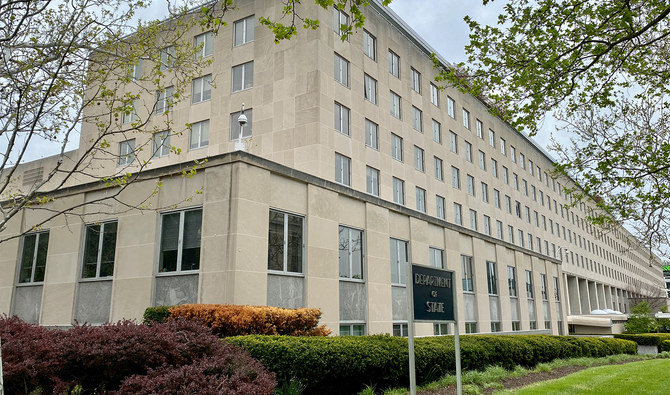
- US State Department releases annual “Country Reports on Human Rights Practices” for the year 2023
- Report says Pakistan witnessed extrajudicial killings, torture and restrictions on media freedoms last year
ISLAMABAD: Pakistan’s government “rarely” took steps to identify and punish officials who may have been involved in rights abuses in 2023, a report released by the US State Department said on Tuesday, pointing out incidents of extrajudicial killings, torture, enforced disappearances, violence against journalists and restrictions on media freedom had taken place in the country last year.
US Department of State released its annual “Country Reports on Human Rights Practices” to highlight rights issues in several countries, including Pakistan. In the report, Washington identified that Pakistan last year witnessed arbitrary killings, extrajudicial killings, enforced disappearance, torture and “cases of cruel, inhuman, or degrading treatment or punishment by the government or its agents.”
“The government rarely took credible steps to identify and punish officials who may have committed human rights abuses,” the report said.
Cases of “enforced disappearances” of citizens have long plagued Pakistan, where militants have waged a war against the state for decades. Families say people picked up by security forces often disappear for years, and are sometimes found dead, with no official explanation. Pakistani security agencies deny involvement in such disappearances.
The report also pointed out that last year Pakistan had seen incidents of restrictions on freedom of expression and media freedom, violence against journalists, unjustified arrests, disappearances of journalists, censorship and criminal defamation laws.
Pakistan’s recent actions to restrict Internet and mobile services throughout the country, especially on days when elections are held, have invited criticism from rights organizations and Washington. The interior ministry last week confirmed it had banned social media platform X in February to protect national security, maintain public order, and preserve the country’s “integrity.”
The State Department report further pointed out that rights issues in Pakistan during 2023 included extensive gender-based violence, including domestic or intimate partner violence, sexual violence, early, child and forced marriages. It said Pakistan had also reported incidents of female genital mutilation and crimes involving violence or threats of violence targeting members of religious, racial and ethnic minorities.
The report added that violence, abuse and social and religious intolerance by militant organizations and other non-state actors, both local and foreign, contributed to a culture of lawlessness in the country.
“Terrorist and cross-border militant attacks against civilians, soldiers, and police caused hundreds of casualties,” the report noted, crediting Pakistan’s military, police and other law enforcement agencies for carrying out “significant campaigns” against militants last year.
The South Asian country has seen an uptick in violence, mainly suicide attacks, since November 2022 when a fragile truce between militants and the state broke down. Pakistan has since then carried out military operations against the Pakistani Taliban or the Tehreek-e-Taliban Pakistan (TTP) and a Baloch separatist militant organization, the Balochistan Liberation Army (BLA) in the country’s two western provinces that border Afghanistan.
Iranian president in Lahore on second day of official visit to Pakistan
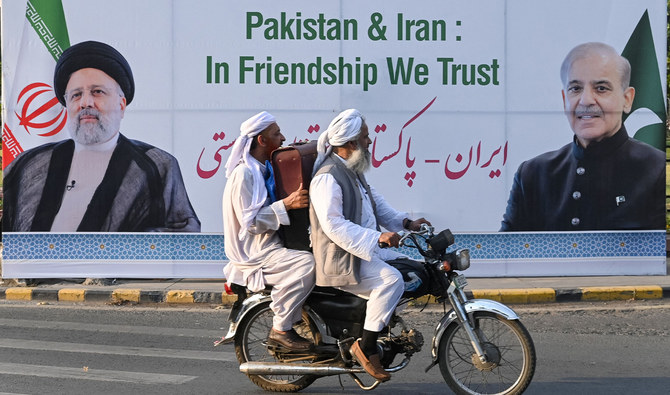
- On Monday, Islamabad and Tehran signed eight accords including on trade, technology, health, culture, information
- Interior ministers of Pakistan and Iran agree on joint action plan to deal with terrorism, smuggling, drug trafficking
ISLAMABAD: Iranian President Ebrahim Raisi arrived in Lahore on Tuesday on the second day of a three-day visit to Pakistan where he will meet top government officials and business leaders before traveling to the country’s commercial hub, Karachi.
Raisi arrived in Islamabad on Monday on a three-day visit as the two Muslim neighbors seek to mend ties after unprecedented tit-for-tat military strikes earlier this year. The Iranian official’s visit is the first by any head of state to Pakistan after the South Asian nation’s February general elections and the formation of a new government headed by Prime Minister Shehbaz Sharif. The visit also comes as tensions are high in the Middle East after Iran launched airstrikes on Israel a week ago and Israel retaliated with its own attack on Friday.
“Iranian President Syed Ibrahim Raisi has reached Lahore,” state television PTV reported, where he was received by Punjab Chief Minister Maryam Nawaz.
The Iranian president began his Lahore trip by visiting the mausoleum of Allama Muhammad Iqbal, Pakistan’s national poet, whose literary works in the Persian language have garnered him wide recognition in Iran.
After meetings in Lahore, Raisi will travel to Karachi, where he will hold meetings with the provincial leadership and be awarded an honorary doctorate by the University of Karachi, state-run Radio Pakistan reported.
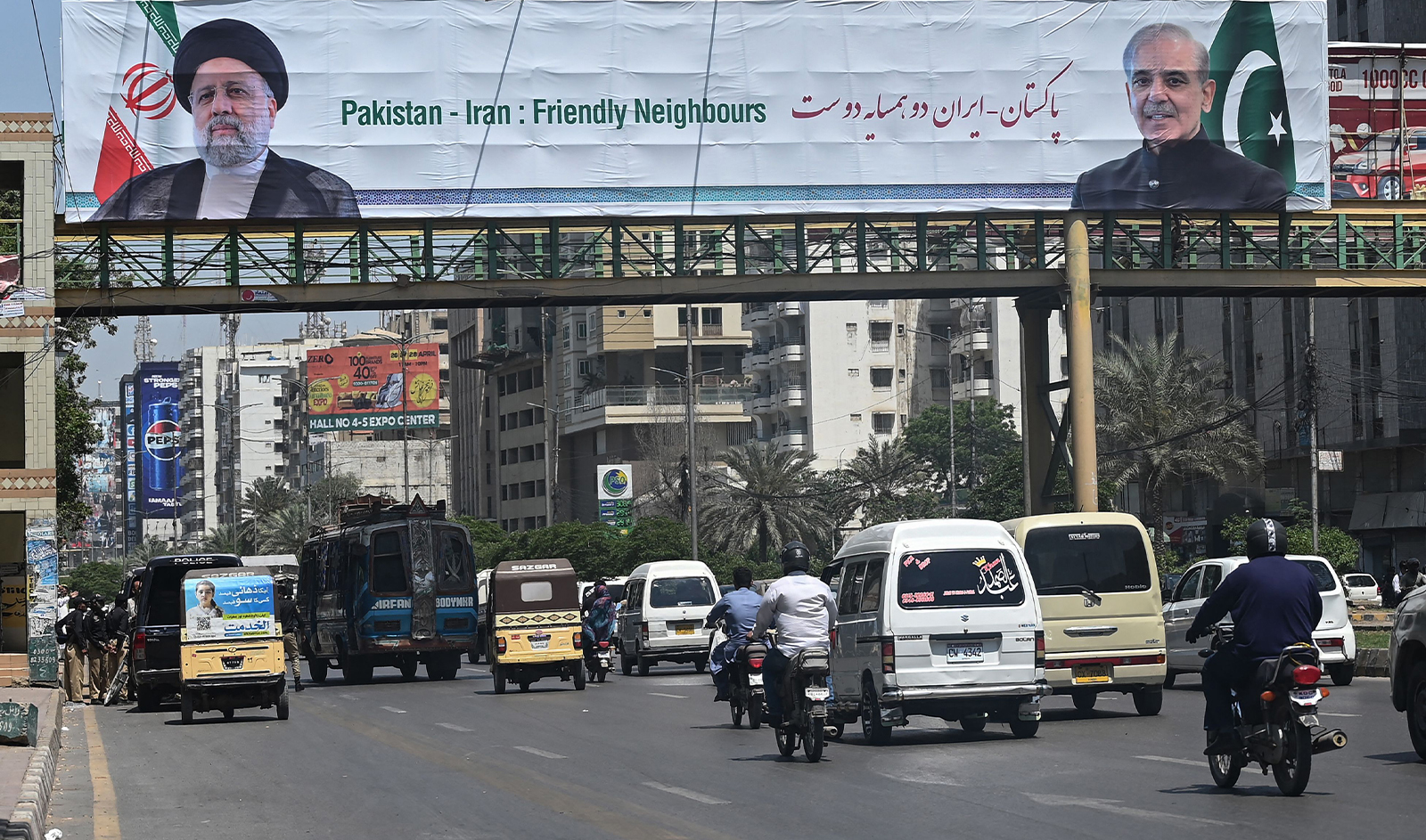
On Monday, Raisi held delegation-level meetings in the Pakistani capital as well as one-on-one discussions with the prime minister, president, army chief, chairman senate and speaker national assembly.
He also witnessed the signing of eight MoUs and agreements covering different fields including trade, science technology, agriculture, health, culture, and judicial matters. These include an MoU on the establishment of the Rimdan-Gabd Joint Free/Special Zone; on cooperation between the Ministry of Cooperative Labour and Social Welfare of Iran and the Ministry of Overseas Pakistani and Human Resources Development of Pakistan; on judicial assistance and legal cooperation at the ministry levels; on cooperation for animal hygiene and health; on mutual recognition in the field of quarantine and phytosanitary; and on the promotion of culture and films.
“The economic and trade volume between Iran and Pakistan is not acceptable at all and we have decided at the first step to increase the trade volume between our two countries to $10 billion,” Raisi said at a joint press conference with Sharif.
The interior ministers of Pakistan and Iran also met on Monday and discussed border management to prevent smuggling and drugs trafficking, and “decided in principle to ban terrorist organizations in their respective countries,” state news wire APP said.
“The two sides agreed on a joint plan of action to deal with the menace of terrorism being a common problem, with further improving mutual support and exchange of intelligence information.”
A security agreement regarding this decision would be signed “at the earliest,” APP added.
Pakistan and Iran have had a history of rocky relations despite a number of commercial pacts, with Islamabad being historically closer to Saudi Arabia and the United States.
Their highest profile agreement is a stalled gas supply deal signed in 2010 to build a pipeline from Iran’s South Fars gas field to Pakistan’s southern provinces of Balochistan and Sindh.
Pakistan and Iran are also often at odds over instability on their shared porous border, with both countries routinely trading blame for not rooting out militancy.
Tensions surged in January when Pakistan and Iran exchanged airstrikes, both claiming to target alleged militant hideouts in each other’s countries. Both sides have since then undertaken peace overtures and restored bilateral ties.



